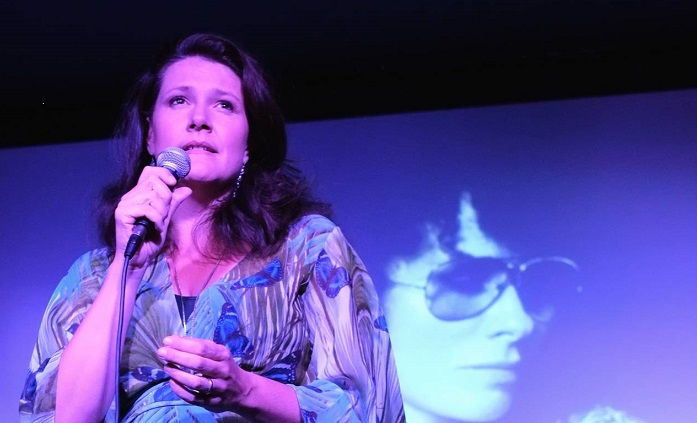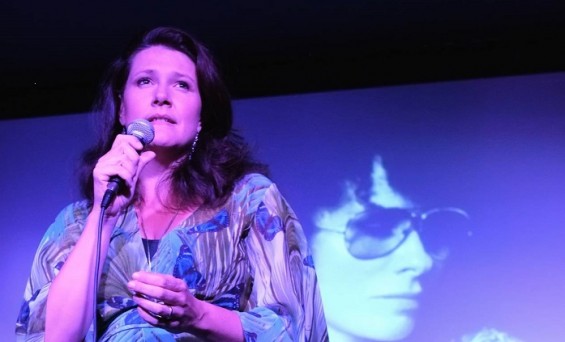Next week, Kate Dimbleby returns to the Crazy Coqs with her critically-acclaimed show about 1970s singer/songwriter Dory Previn. Beware Of Young Girls tells of Previn’s difficult life: her husband left her for the much younger Mia Farrow and she battled against mental illness for much of her life.
I recently caught up with Kate and spoke to her about Previn and the rise of songbook cabaret.
The first time I saw you, you were on the verge of an epic 35-night residency in Hampstead. What have you up to since?
The Dory Previn song Lady with the Braid was at the end of that show. Every night it was the one song people wanted to know more about. Who was she? And why didn’t everyone know about her? I started listening to all her albums and reading her autobiographies and just felt a real connection with her music and extraordinary life story – it felt like she was an artist who hasn’t been acclaimed as much as she should. My pianist Naadia Sheriff was similarly gripped so we set about working on her songbook. A tiny gig in a Leicester Square basement led to an album which we sent to Dory five days before she died. It was very odd timing. Her second husband became a real supporter of what we were doing.
I was approached by the producer of the new Matcham Room the Hippodrome Casino about doing a week residency there. So I got a team together including long-term friend and director Cal McCrystal (One Man, Two Guvnors) and writer Amy Rosenthal. Both of them coincidentally had been fans of Dory since their youth. That was the beginning of the live show. We have been touring around the UK on and off since and we’re off to New York in December. A real dream come true for me.
Oh, and I recorded a new album of songs with my band called Love Comes Again which will be released soon. I hope it captures some of the spirit of my live cabaret shows over the past 20 years along with some collaborations with other artists.
Your last show about Dory Previn went down a storm. To those who only recognise her surname, why would you say she is still relevant to modern audiences?
She is a totally unique songwriter and there is no-one writing like that today. She is kind of old school vaudeville with the honesty of a 1970s singer/songwriter. Ruthlessly honest but with an amazing sense of humour. The combination is just brilliant. Add to that her musical sensibilities which range from country to Broadway to gospel and a life story that includes, break up, breakdown infidelity, madness and religion. Her take on life is one that is immensely life affirming. She had, in some ways, a really difficult life but her resilience and her determination to help herself by really questioning everything around her is inspiring.
There seems to be more and more TV performers dipping their toes into songbook cabaret. In America, there’s Mad Men‘s Bryan Batt, The Newsroom‘s Jeff Daniels and Homeland‘s Mandy Patinkin and over here Alexander Armstrong (Pointless), Celia Imrie (Dinnerladies) and Martine McCutcheon (Eastenders). What words of wisdom would you pass onto these relative novices in terms of show construction, building an audience rapport?
I don’t think I can really dish out advice but I know how it has been for me. When I started, I didn’t really think of myself as a cabaret performer. I just knew I had some stories to tell and I loved to do that through a mix of singing and words. I definitely had to find my way as well as my venues but it was quite liberating if sometimes frustrating. When I started, not many people were doing that kind of thing in London – in fact it was quite unfashionable.
The most important thing I’ve learnt is that you have to make it your own. Whatever you’re singing, you have to dig deep and find your connection with the song and then take the audience with you. And be brave! The audience don’t want perfection, they want a connection with you. Recently, I have felt that its the audience really make the show. Their engagement changes how you feel from moment to moment. And all the best stuff happens when you go wrong. Of course, a structure is always important but the whole fun in cabaret is the unplanned bits.
I think the reason I’ve enjoyed playing the characters of the songbook shows I’ve done is that there is that three-way relationship going – the audience, you and the singer or songwriter whose song you are capturing. Every song gives you have a chance to tell a new story depending on who is in the room, how you feel, how they feel. It is a brilliant fusion of past, present and future…when everyone is connected, it is an amazing experience.
Songbook cabaret is definitely on the rise with venues like Crazy Coqs one of at least five venues at which it can be enjoyed. What do you think is behind this resurgence?
No idea really. The interactive side of it is important because that’s how everyone lives their lives now so audiences are less passive possibly, and happy to get involved in a way that they might not have been before. And nostalgia for music from different decades. I know that with the Dory show, the audience are a real mix of many who’ve never heard of her and a few who have treasured her music throughout the 1970s. Everyone is on a journey to rediscover what she had to say – each show is like a journey not a rehashing of some old thing.
What do you think of song-based talent shows like The Voice and The X Factor? Do you watch them? Would you consider being part of one of those competitions a judge or contestant?
I was weirdly addicted to those programmes – particularly recently The Voice – but then I started feeling really empty after watching them. I only recently realised it was because the show started with the this unveiling of all these wonderful singers totally uninitiated into the world of showbiz. For me, those first notes they sang were always moving. Because actually if you are singing from your gut and your own experience, it will always be compelling because it is your sound. But then as the show went on and the stylists and voice coaches etc. got involved, most of the contestants seem to lose what they initially went in with. It was a depressing exposé of my (small) experience of the music/entertainment industry.
Dory had a good view on that too. She started writing songs with André Previn in 1950s Hollywood. She had a breakdown and lost it all. Her view was “if you’re a winner and you lose, it’s devastating but if you’re a loser and you occasionally win, it’s fantastic!” There’s a lot to be said for having nothing left to lose.
What are your ambitions for the Dory Previn show? Or are you already working on the next production?
I’m always dreaming up some new idea or other. I have lots on the go at the moment including a very different format to any I’ve done before but I have learnt to trust that it will all come together when the time is right. So I just keep listening, singing every day and being open to the opportunities that come my way. Lucky for me, my family and I have moved to Bristol where there is just so much going on and particularly exciting in that there is so much enthusiasm for collaboration and experimentation in the boundary breaking that I’ve always enjoyed.
The Dory Previn show is off to New York at Christmas which is pretty much the fulfilment of a lifetime ambition. And we are playing various venues around the UK before and after that. I’m writing a lot and doing the launch for the new album in the Autumn in London. Very exciting. Lots to look forward to.
Kate Dimbleby performs her Dory Previn Story at The Crazy Coqs, Brasserie Zedel, Piccadilly, W1. June 24 – 26. Tickets £20 Available online: www.crazycoqs.com or phone 020 7734 4888




Recent Comments